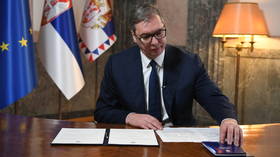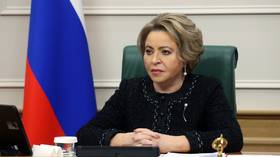European country calls snap elections to ‘reduce tensions’

Serbian President Aleksandar Vucic disbanded the country's parliament on Wednesday and scheduled general and local elections for December 17. The move came after European Commission President Ursula von der Leyen visited Belgrade, promising EU membership – but at a price.
In addition to electing all 250 members of the National Assembly, citizens of Serbia will elect mayors of 11 cities, including the capital Belgrade, as well as the heads of 54 counties.
On Monday the cabinet of Prime Minister Ana Brnabic backed the new elections on Monday, telling Vucic in an official letter that doing so would “ensure a greater degree of democracy” and “reduce tensions” within society while “affirming European values.”
Serbia last held a general election in April 2022 and was not due for another until 2026. However, several opposition parties have co-opted popular outrage over a school shooting in May to demand a snap vote.
“Whoever wins the election will have a clear mandate through 2027,” Vucic said on Sunday, announcing his intent to call the election. “There will not be another election until then.”
He added that the next government “will have to bring us to the point of no return to the past, no going back. The country must move forward.”
Vucic and his Serbian Progressive Party (SNS) have dominated Serbian politics since 2012, replacing the self-styled liberal democrats installed by the 2000 color revolution. His government claims to be centrist-populist, and has refused to join the EU sanctions against Russia or recognize the breakaway province of Kosovo as independent.
The EU has made both those things a precondition for any membership talks, however. Visiting Belgrade on Tuesday, von der Leyen spelled out that Belgrade was expected to implement the so-called Franco-German plan for “normalizing relations” with Kosovo – i.e. recognition – and “synchronize” its foreign policy with Brussels, meaning sanctioning Moscow.
“We want Serbia to join our union. The offer is based on trust, on reciprocity and on partnership. It is a promise of peace and prosperity, and it is a unique opportunity right now that no one else can match,” the German politician said.
While Bosnian Serb leader Milorad Dodik has suggested that the countries of the former Yugoslavia ought to join BRICS instead, Vucic’s official policy is still that Serbia needs EU membership. While the ‘sovereignist’ critics have accused Vucic of gradually surrendering to the bloc’s demands, the ‘liberal’ opposition has criticized him for not doing so fast enough.













